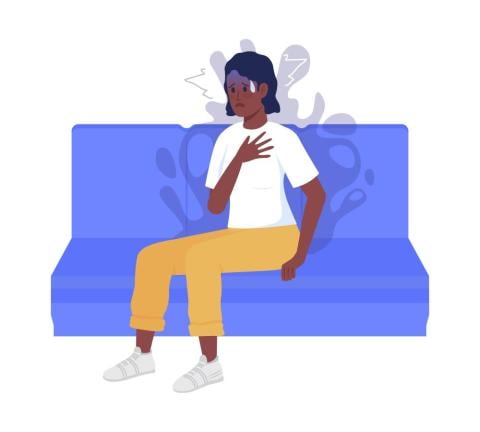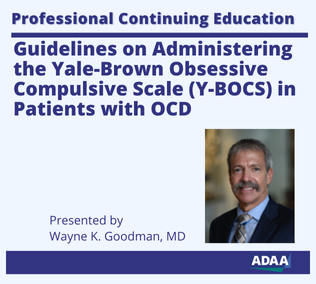Inferential Confusion: A New Treatment Target for OCD
Inferential Confusion: A New Treatment Target for OCD

When you woke up today, got out of bed, and went into your kitchen, there were many possibilities around you that could come true:
The microwave might fail causing a fire.
The sink could overflow causing a flood.
The power could be off causing all of the contents in your refrigerator to spoil.
The roof could collapse due to termites.
But you probably didn’t even think of those possibilities. Those situations, while possible, weren’t relevant to that moment in time based on the information your senses were giving you.
This normal reasoning process is what we use throughout our day. It guides us to make inferences about possibility based on trust in our senses and selves. Normal reasoning also uses relevant associations (example: smoke and flames are indicative of fire). We don’t reason that the microwave is failing and causing a fire unless we smell smoke or see sparks or flames.
In other words, we live in a state of certainty that things are okay until we are told by our senses that there is reason to infer that a possibility has now become relevant to the here & now moment: I smell smoke and see sparks coming from near the microwave. I infer that the possibility that the microwave is on fire is relevant to this moment, and I need to act.
This normal kind of reasoning about possibility is not what is happening in OCD. Often, those with OCD treat possibilities without direct evidence in the senses as if they are actually relevant to the here now. They often even consider possibilities despite what their senses are telling them. This is called inferential confusion; the person confuses an imaginary abstract possibility with a relevant probability based in the senses.
Some examples:
- You turn off the faucet. You see it is off, and yet you infer: Maybe the faucet isn’t really off.
- You have no intention of hitting someone with your car on purpose, and yet you infer: Maybe I am capable of hitting someone with my car.
- You are in a home where no one is sick, and yet you infer: Maybe I could get sick from sitting on this couch.
Inferential confusion is made up of three main components:
- Over-Reliance on Possibility
- Distrust of the Senses/Self
- Irrelevant Associations
If you have OCD, in certain situations you:
- over-rely on possibility. Without even checking in with your senses, you may walk into the kitchen and make an imagined assumption based on possibility alone. Maybe the faucet is going to cause a flood.
- don’t trust your senses. You don’t see water dripping from the faucet, and yet you ignore that information and think, Maybe the faucet is really on.
- you use information out-of-context. You remember a story you read about someone who left the sink on all day and you think, Maybe I could leave the faucet on at my home too.
Inferential confusion is a reasoning process that is directly addressed in Inference-based Cognitive Behavioral Therapy (I-CBT) developed by Dr. Frederick Aardema and the late Dr. Kieron O’Connor. Obsessions have historically been seen as random, intrusive thoughts. But according to I-CBT, they aren’t random at all. They are constructed, and this is good news for OCD sufferers.
According to the robust body of literature now supporting I-CBT, the key to treating OCD is to target Inferential Confusion. If we break-down and demystify how obsessional doubts come to be, then OCD sufferers have a new way to gain agency. When facing OCD triggers, people with OCD can learn how they got tricked into believing they needed to act on that trigger. They can learn to trust their senses again in triggering situations and use information in-context to that moment in time. They can learn that without direct evidence from the senses, something being possible doesn’t mean we have to act on it as if it is reality.
Possibility only becomes relevant to this moment in time if we have direct evidence from our senses supporting it. I-CBT brings a fresh look to OCD treatment:
- If we target inferential confusion, the obsessional doubt holds no weight. It loses its power. The sufferer can now see how they were tricked into believing it.
- If the obsessional doubt holds no weight, there is no anxiety.
- Without anxiety, there is no need for compulsions.
- The trigger itself is no longer triggering.
Treating inferential confusion gives OCD sufferers the answers to how OCD tricks them and why they doubt the specific things they do. It puts the power back in the hands of OCD sufferers so that when they wake up in the morning to start their day, they can be firmly planted in normal reasoning even when facing their triggers.
Recommended Reading and more information:
- O'Connor, K. & Aardema, F. (2012). The Clinician's OCD Manual: Inference Based Therapy. Chichester, UK: Wiley.
- https://icbt.online/ - official website with free resources and information on I-CBT
- https://ocdtrainingschool.com/ - OCD Training School website for information about I-CBT training and consultation.
This post is presented in collaboration with ADAA's OCD and Related Disorders SIG. Learn more about the SIG.




















